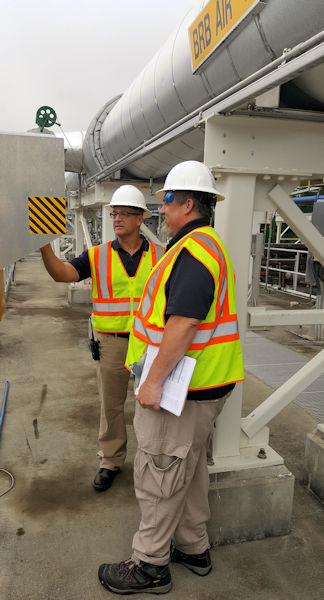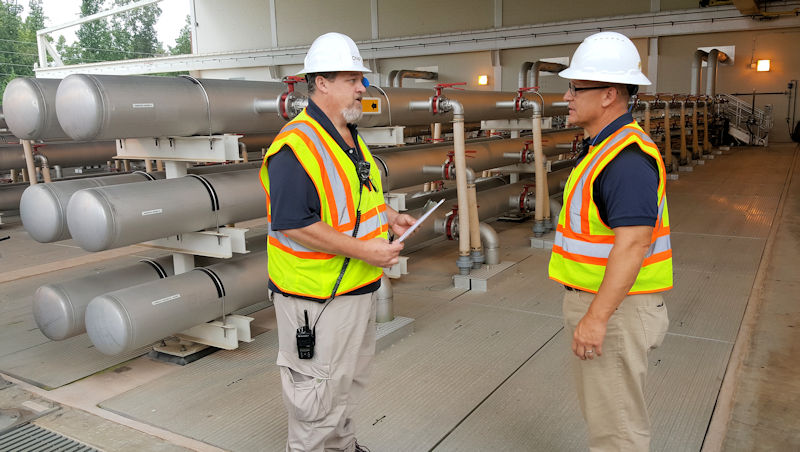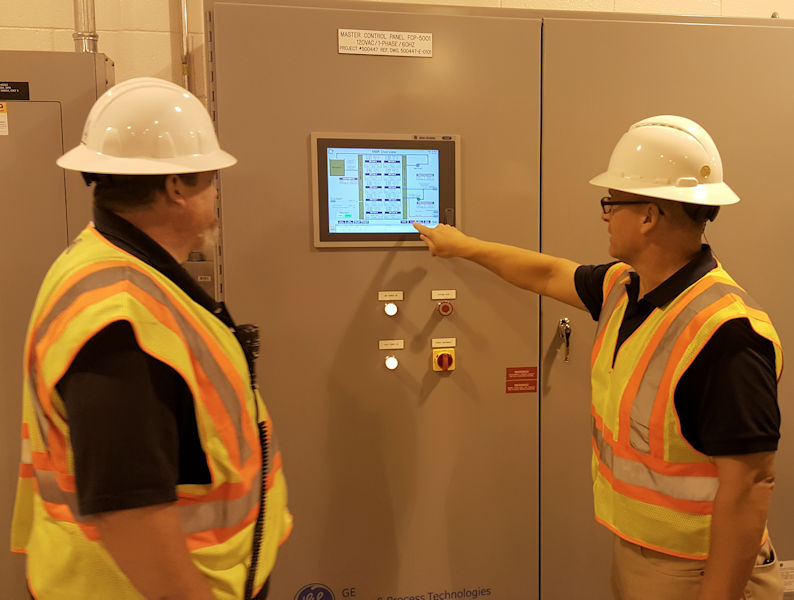
Gwinnett County (Ga.) Superintendent Ben Bagwell trains operator Chip Brand on the biological reactors at Gwinnett County’s Yellow River Water Reclamation Facility. Photo courtesy of Gwinnett County Department of Water Resources.
When it comes to training operators in wastewater treatment, one size does not fit all. Gwinnett County, Ga., figured this out in 2014 when it set a new goal to become a “utility of the future.” This process began with assessing the utility’s status by looking at its existing facilities and treatment processes, such as membrane filtration, ozone treatment, and Ostara nutrient removal, said Frank Loethan, training section manager.
“We figured out we needed better skill sets,” Loethan said.
“We’ve been able to implement some of the most advanced technologies in the world at our facilities,” said Rebecca Shelton, deputy director of the Department of Water Resources for Gwinnett County. “We would like to make sure we had the staff necessary to use these facilities, that they can handle operations and maintenance. We needed to go beyond basic training and certification.”
So, the county developed progression paths for new operators that would take them from entry-level certifications to the management level. To design the program, the team needed to figure out how the steps would be delineated, so it began gathering input, Loethan said.
Designing the program

Bagwell trains Brand on the membrane process at Gwinnett County’s Yellow River Water Reclamation Facility. Photo courtesy of Gwinnett County Department of Water Resources.
According to Loethan and Shelton, several steps had to take place before they could decide on the new progression training program for operators. Loethan reached out to other companies — some within the water sector and some outside of it — to get a better understanding of how they conducted their training. In addition to visiting the Metropolitan St. Louis Sewer District and reviewing their in-house training program, the team visited Delta Air Lines (Atlanta) and UPS (Atlanta) to “see how they do things,” Loethan said. The county also conducted a survey of utility employees before implementing changes.
“We had a consultant come in and ask if the employees are ready for this. Turns out they do want training,” Loethan said.
After completing these steps, Gwinnett County developed standard operating procedures, online training, and qualification cards with skill-based signoffs to assist in training operators, Loethan said. Both staff and outside consultants conduct the training.
Securing staff buy-in

Bagwell continues Brand’s training with the supervisory control and data acquisition (SCADA) system at Gwinnett County’s Yellow River Water Reclamation Facility. Photo courtesy of Gwinnett County Department of Water Resources.
Staff has been receptive to the new training requirements. “They’ve been very acceptant of the environment changing around them,” Loethan said.
As of now, only parts of the training program have been implemented. “We’re going to do it by group, rolling out progressions one at a time,” Shelton said.
The utility is tracking the number of hours of training per employee, which averages 45 hours annually, Loethan said.
With increased training on complex wastewater treatment processes for skilled employees, some utilities might worry that they would lose their highly trained operators to other utilities, but it isn’t a major concern for Gwinnett County, Shelton said.
“We’ve adapted the principle in that we would much rather have people that are properly trained and see some of them leave than have people here who don’t have all the necessary training,” Shelton said.
While they sometimes do “lose people to other industries, … the more skilled people we have, the more we can handle turnover,” Loethan said.
— LaShell Stratton-Childers, WEF Highlights








March 26, 2018
Featured